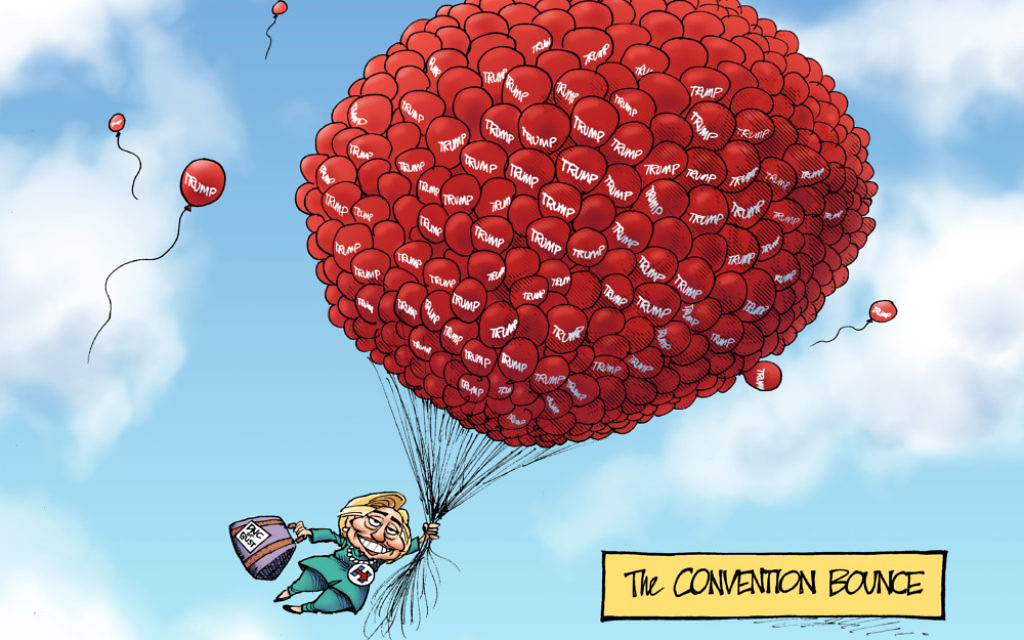Presidential Election Isn’t Either/Or
So the two major-party tickets are set: Republicans Donald Trump and Mike Pence vs. Democrats Hillary Clinton and Tim Kaine. I suspect most Americans would feel better about voting for either vice presidential candidate than either presidential nominee, but this is the race we have.
My biggest hope is for Libertarian nominee Gary Johnson to rise enough in the polls to force his way into the fall debates and thus show voters there is an alternative to the major parties.
If you judge support for Israel in terms of foreign aid, Johnson isn’t your guy; as a Libertarian, he opposes foreign aid. But if you’re tired of seeing the White House put all the pressure on Israel to make concessions to the Palestinians, Johnson is viable: He has said we should support Israel and let it work out its own solution with the Palestinians.
Get The AJT Newsletter by email and never miss our top stories Free Sign Up
Johnson would pass the debate threshold for sure if he had the support of the 3 percent to 5 percent who favor Green Party candidate Jill Stein, a nonpracticing Jew who wants to boycott Israel.
Johnson has little chance to win, but he has no chance if people wrongly believe that a vote is wasted if it’s not cast for a Democrat or a Republican. Your vote is never wasted if you give it to the candidate you believe is best for the job.
In the long run, losing one election isn’t a disaster; sometimes, even though we invest increasing amounts of time, money and venom every four years, a loss is beneficial.
Jimmy Carter was a bad president, but if he had lost to Gerald Ford in 1976, Ronald Reagan wouldn’t have been elected in 1980. Losing a close election in 1976 was good for the Republican Party, and the outcome worked well for the rest of us.
On the flip side, Democrats were despondent when John Kerry couldn’t beat George W. Bush in 2004, but Kerry would have been stuck with two wars and a real estate bubble ready to burst. Nothing would have changed except a couple of names on the Supreme Court.
Oh, and a freshman senator from Illinois named Barack Obama wouldn’t have been elected in 2008.
More often than not, history shows, the times make the president rather than the other way around.
Despite all the political noise and anger, it’s rare when a president pushes us outside a narrow policy range. Reagan’s biggest domestic achievement was making a 70 percent income tax rate (the top rate when he took office) inconceivable to generations of Americans. Obama’s top achievement may be making a single-payer health care system conceivable.
So many other presidents’ most important contribution was to set the field for their successors.
George H.W. Bush, for example, prepared us for eight years of Bill Clinton, eight years of a second Bush and now, perhaps, at least four years of a second Clinton. If we’d elected President Mike Dukakis in 1988, we would have gone through the same recession and fought the same war to drive Saddam Hussein out of Kuwait, but we wouldn’t have elected Bill Clinton in 1992.
Look back to 1856, when the Republican Party ran John C. Fremont as its first presidential candidate. He lost a multiway race to James Buchanan, a contender for worst president ever. If Fremont had won, Abraham Lincoln, who tops most presidential rankings, would not have been elected in 1860 or probably any other year.
Maybe it’s time for the Republicans, like the Whigs they replaced, to fade away, or maybe the shock and awe of Trump vs. Clinton will spark a GOP revival. Either way, the path forward for the nation is more promising if instead of voting against Trump or against Clinton, people choose candidates they actually like.






comments